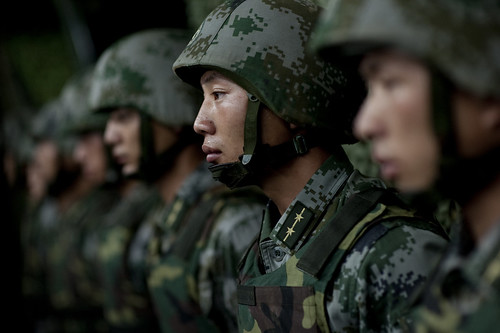
OSAKA – Do China’s rulers have full civilian control of their country’s military? Asian governments are now regularly asking themselves that question as China hardens its stance on its claims to islands in the South and East China Seas.
Perhaps the gravest incident so far came this January, when Chinese naval forces twice locked their weapons’ radar systems – the final step before firing – on a Japanese destroyer and a patrol helicopter. In the diplomatic ruckus that ensued, a Chinese foreign ministry spokesperson was, at first, utterly ignorant of the incident and asked that the journalists posing the questions put them directly to the Peoples’ Liberation Army (PLA) leadership.
No major reshuffle at China’s naval command has been reported since then. Instead, China’s new president, Xi Jinping, spoke emphatically of the need to strengthen the country’s military power for territorial defense. Xi, it now appears, approved the military’s decision to target the Japanese vessels after the fact. But control after the fact is no control at all.
China’s one-party dictatorship places the Chinese Communist Party above the state. The CCP predates the establishment of the People’s Republic in 1949, at which point the CCP’s revolutionary guerrilla troops became the country’s military. Consequently, unlike in liberal democracies, the military remains under direct CCP control, which is exercised through the party’s Central Military Commission. The commission’s members are elected by the CCP Central Committee, and, after automatic election a few months later by the National People’s Congress, serve concurrently on the state’s counterpart organ, thereby giving the state pro forma control of the military.
In reality, however, the twin Central Military Commissions currently comprise only one civilian leader – the chairman, Xi, who has no real military experience or expertise – alongside ten military leaders, including two vice chairmen who are also CCP Politburo members. There is no civilian vice chairman, which had become customary over the last decade.
It is frequently said that Xi’s family background, with his father’s close military ties, provides all the legitimacy that he needs to keep the PLA in line. But, as the incidents with Japan suggest, Xi certainly did not appear to be in full control at the time.
The CCP increasingly relies on the military to legitimize its rule and to serve as the final arbiter of social control in the face of exponential growth in civil unrest stemming from the China’s deepening economic inequality. Moreover, now that its communist ideology of egalitarianism is defunct, the regime’s legitimacy is based on an appeal to nationalism, of which the PLA is the ultimate symbol.
Indeed, the regime’s irredentist claims in the East and South China Seas appear to be intended to divert popular discontent, with Japan singled out for public rage, while the regime’s embrace of nationalism has given the military greater political clout. In such an atmosphere, can China’s top civilian leaders curb the PLA if it is determined to act?
Among post-revolutionary Asian developing countries, the example of Imperial Japan is perhaps the most resonant here. Japan entered modernity after the Meiji Restoration in 1868, and its constitutional monarchy gradually evolved into a functioning parliamentary democracy around the early 1920’s. But the polity lacked a constitutional mechanism for civilian control of the military, while the emperor was the designated supreme commander.
This deep flaw went unrecognized during the first generation of Meiji revolutionaries, whose strong sense of unity, owing to their very similar military-political backgrounds and experiences, enabled them to practice a form of division of labor between the civilian leadership and the military. But, with the passing of the founding revolutionary generation, this discipline and control melted away.
The result was episodes like the Manchurian Incident of 1931, in which Japanese forces in China took military action in defiance of the civilian government’s policy. The government approved the action after the fact, consequently becoming less and less able to control the military effectively.
Today’s China bears some striking similarities to Imperial Japan. Aside from the widening income disparity and snowballing socioeconomic problems at home, China’s rise has confronted it with an increasingly challenging security environment in the form of America’s “pivot to Asia” and an increasingly nervous Japan. Meanwhile, the Chinese state apparatus is largely detached from the military, while the party’s top civilian leaders, despite their nominal prerogatives, have only a loose grip on the generals.
Worse still, the current fifth generation of civilian leaders is made up of veritable dwarfs in military affairs. By contrast, the PLA’s leaders have become increasingly professionalized, but without the tempering influence of effective civilian control, which might well collapse entirely if China’s leaders continue to accept unauthorized military actions, particularly in the East or South China Sea, as faits accomplis. Line commanders could take advantage of the equivocality of civilian policy, particularly given the military’s growing political clout and the CCP’s dependence on popular nationalist sentiment.
For Japan and its strategic partner, the United States, the need to strengthen the alliance’s capacity to deter acts of Chinese aggression is all too clear. But they should also raise the issue of China’s worrisome civilian-military relations directly with its top leaders.
Copyright Project Syndicate
For additional reading on this topic please see:
Contemporary China – CCP, Army and the 18th Central Committee
Breaking with the Past? Civil-Military Relations in the Emerging Democracies of East Asia
Civilian Control over the Military in East Asia
For more information on issues and events that shape our world please visit the ISN’s featured editorial content and Security Watch.

